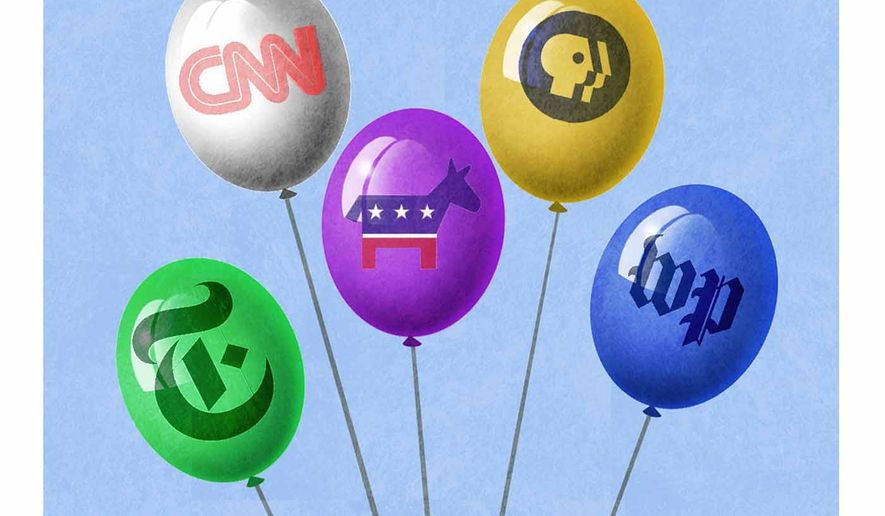OPINION:
With Labor Day 2022 now in our rearview mirror, Election 2022 is officially here, a nine-week run to decide who controls Congress and more than 35 state governorships.
For the past several months, pollsters and politicos have been saying that Republicans are poised for big wins on Nov. 8. But all that has changed as the liberal media seek to recast the races as tight.
“Could unexpected Democratic gains foil a midterm Republican victory?” The Guardian reported last week. “Red wave crashing? GOP momentum slips as fall sprint begins,” wrote The Associated Press. “From a Republican ’tsunami’ to a ’puddle,’” opined CNN.
“It was a referendum. Now it’s a choice,” read the CNN analysis by Ronald Brownstein. “For political professionals in both parties, that’s the capsule explanation for why the Democratic position in the midterm elections appears to have improved so much since summer began.”
While Mr. Brownstein cited “evidence suggesting more voters are treating the election as a comparative choice between the two parties,” the piece offered mostly anecdotal claims. But one, from a Republican pollster, put forward an interesting notion.
“It is a really unusual election,” Bill McInturff of Public Opinion Strategies told the liberal outlet. “Republicans have significant advantages on their set of issues (inflation, economy, crime, border security) and Democrats enjoy significant advantages on issues of concern to their voters (abortion, climate change, guns, health care).”
“There is no overlap, no competitive issues. This means each party has an unusual opportunity to try to create their own narrative to their own voters on what this election is about,” he wrote.
The pollster sought to put those “sets of issues” on the same level — which they most definitely are not. Soaring inflation — especially sky-high gas and food prices — is the top issue, while things like climate change and Second Amendment rights poll well down the list of issues in nationwide surveys.
Take a piece from PBS last month, headlined: “Inflation, personal expenses rise sharply as election priorities, poll suggests.”
“Concerns about inflation and personal finances have surged while COVID has evaporated as a top issue for Americans, a new poll shows, marking an upheaval in priorities just months before critical midterm elections,” said the article from another liberal news outlet.
YouGovAmerica found much the same in a July poll. Twenty-four percent put soaring prices as the top issue, with 12% saying jobs and the economy as No. 1. Concern about health care fell to just 10%, while abortion dropped to 6% and guns to 5% — despite a headline this week from The Washington Post that read, “In sprint to November, Democrats seize on shifting landscape over abortion.”
Meanwhile, media outlets have all gotten out the same talking points over the last month: President Joe Biden’s doing better. The president’s approval rating had been hovering in the mid-to-high-30s, but over the past month climbed back into the 40s.
But that is already starting to change again. “Biden approval falls, holding near low end of his presidency,” Reuters wrote on the last day of August.
“U.S. President Joe Biden’s public approval rating fell modestly this week, a poor sign for his Democratic Party’s hopes in the Nov. 8 midterm elections, according to a Reuters/Ipsos opinion poll completed on Tuesday. The two-day national poll found that 38% of Americans approve of Biden’s job performance,” the news agency wrote.
Same as it ever was.
And the numbers on another key barometer were even worse, according to a running average compiled by Real Clear Politics. Just 23.2% of Americans think the country is moving in the right direction, while a whopping 70% think it’s all moving in the wrong direction.
It’s worth noting that the party in the White House almost always loses congressional seats in the president’s first midterm election. While Ronald Reagan lost 26 House seats, Trump 40, Bill Clinton lost 52 and Barack Obama 63. Only George W. Bush’s Republican Party picked up seats — eight — in his first midterm, which came after the Sept. 11 terrorist attacks.
But the bottom line is simple: Americans vote with their wallets, choosing the candidates who are best for them financially. While they may still care deeply about other issues, their state most often decides which way they go on Election Day.
And for the record, it was former President Bill Clinton’s own campaign guru who spelled out that fact in just four words: “It’s the economy, stupid,” James Carville said in 1992.
Despite the breathless predictions now that the election will be close (a few months ago, prognosticators had been predicting a 50-60 seat pickup by Republicans), the economy will be the key issue — and the GOP routinely polls better on that issue.
And judging from the number of Democrats dodging appearances with Mr. Biden, few want to get his stink on them.
• Joseph Curl covered the White House and politics for a decade for The Washington Times. He can be reached at josephcurl@gmail.com and on Twitter @josephcurl




Please read our comment policy before commenting.